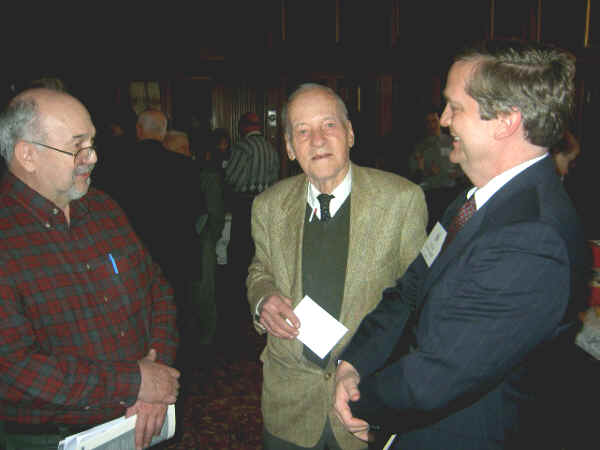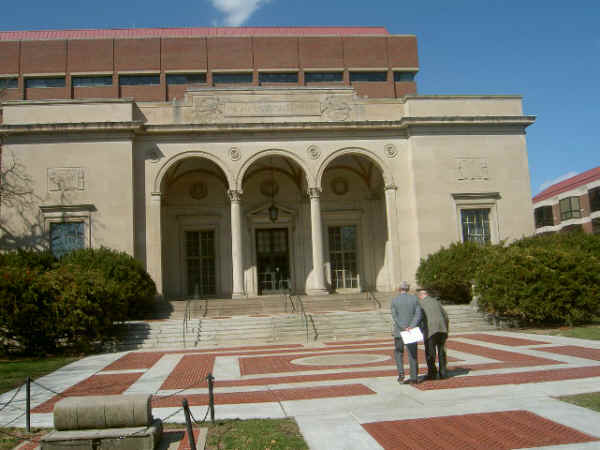
Bay Cityans Alan Flood, retired Great Lakes mariner and local historian, left, and Peter B. Frantz, architect, chat with new Clements Library Director J. Kevin Graffagnino at Founders Day at the Clements Library. William L. Clements Library Celebrates Anniversary of Birth of Founder
|
|||||||||||
| Printer Friendly Story View |
The days when the name William L. Clements was a household word in Bay City are long gone.
So, too, is his magnificent mansion, Garra Tighe, at the northeast corner of Center and Park Avenues.
The industry he built, Industrial Brown-Hoist, lies in shambles on a 48-acre site in downtown Bay City.
Its soaring factory buildings are rusting testimony to the colossal industrial empire that produced the world's largest cranes from 1870 until closing in 1976.
Clements Airport survives as a municipal service for general aviation named in honor of William's son, James, who died of the flu in France in 1918 while he was serving as an aviator in the U.S. Army.
But in Ann Arbor, and in the world of bibliophiles and American historians, the name Clements resounds across the land.
For this notable Bay Cityan was among the foremost book collectors of his time. And, his legacy lives on in the library that bears his name.

(MyBayCity Photo by O. J. Cunningham)
A handful of history and book loving Bay Cityans attended Founders Day at the Clements recently, along with dozens of campus folk and Clements Library associates, reveling in the history that exudes from every inch of the magnificent temple of Americana.
Main speaker at the event was Dr. Martha Jones, U-M History professor, who said the Clements has "had a role in undergirding the development of African American history, moving it from the margin to the center." She cited several works by authors who had used the Clements for their research.
The Clements Library, founded by Michigan industrialist William L. Clements, a regent and alumnus of the University of Michigan, was opened in 1923 with the gift of Clements' extraordinary Americana collection -- 20,000 volumes of rare books, 2,000 volumes of early newspapers, several hundred maps, and the papers of Lord Shelburne, the British Prime Minister who negotiated the peace ending the Revolutionary War.
"This is one of the five or six greatest American history collections in the world," exclaimed J. Kevin Graffagnino, new director of the library. "In the world of book collecting Mr. Clements had no betters and very few equals."
The book collecting passion that swept over Mr. Clements began with his connection with another localite, Aaron Cooke, a merchant and elderly Civil War veteran.
Mr. Cooke's personal early collection of about 1,000 books on Americana, sold to Mr. Clements in 1903, formed the basis of the Clements collection that in 1923 was moved to the new building he built on the University of Michigan campus.
"Trapped in an unhappy marriage, Clements found an escape through his books," wrote U-M graduate and noted author James Tobin. "He not only read deeply but treasured the volumes themselves -- the bindings, the tyupefaces, the paper, all of them tangible links to the lost world of early America. Night after night he examined them until all hours. 'I do not know what I would do if I did not have this interest,' he told a friend."
Born April 1, 1861, in Ann Arbor, William L. Clements graduated from the University of Michigan in 1882 with a degree in engineering, and joined his father's firm, the Bay City Industrial Works, manufacturers of steam shovels and cranes.
Clements' fortune was made supplying equipment for the construction of the Panama Canal and other major engineering projects at the turn of the century.
"In 1909, he was elected to the University of Michigan Board of Regents, where his knowledge of engineering and business made him a leader in rebuilding the central campus," states university sources.
Clements began spending most of his income from the Industrial Works on books, $300,000 a year rising to an estimated $500,000 annually. The percentage of his income spent on books reportedly was more than any other major book collector in the U.S.
"The decades from the 1880s through 1920s saw the break up of the British estate system, and the arrival at auction or sale of the contents of many aristocrats' great libraries," states the history of the Clements Library.
"At the same time in the United States, a series of great private libraries were sold. With these fortuitous conditions in the rare book market, and with the advice of expert dealer/bibliographers, Clements made a series of major purchases."
After divorcing his wife, who soon died, Clements then married Kate Fisher, daughter of Simon O. Fisher, West Side lumberman and banker.
Clements suffered heavy financial losses during the early stages of the Great Depression of 1929-1932. His health declined, and he died at his home in Bay City in 1934.
His widow lived in the huge mansion until the cost became untenable. Her efforts to sell the home and grounds to an order of Catholic nuns failed because of opposition from neighbors. The home was then torn down in the early 1950s and the five acre estate developed into a subdivision and individual homes.
Clements Library Director Randolph G. Adams, who served between 1923 and 1951, began to expand Clements' original collections relating to the European discovery, exploration, and colonization of America and the American Revolution.
Between 1924 and 1930, Clements made a series of purchases that created the largest collection of manuscripts in the United States documenting the British side of the American Revolution -- including the papers of British Generals Thomas Gage, Sir Henry Clinton, Cabinet Minister George Germain, and the letters of the Freiherr von Jungkenn, commanding Hessian forces serving with the British army in North America. Clements intended to give these manuscripts to the Library, but suffered heavy losses during the Depression. Upon his death in 1934, his heirs agreed to sell the British collections to the Library. With the help of Detroit philanthropist, Tracy McGregor, they were purchased by installments over the next fourteen years.
Adams organized the Library into three Divisions -- Books, Manuscripts, and Maps. Although funds were limited in the 1930s and 40s, he made important acquisitions, including the papers of General Josiah Harmar. Two acquisitions made possible by the assistance of Prof. Dwight Dumond laid the foundation for the Library's collection of 19th century social and intellectual history -- the papers of anti-slavery activists James Gillespie Birney and Theodore Dwight Weld, Angelina Grimké Weld and Sarah Grimké. Adams was a persuasive speaker and writer, energetically publicizing the new library in the academic world. At his untimely death in 1951, Adams had succeeded in developing Clements' private collection into a research library with an international reputation.
Howard H. Peckham, Adams' successor, who retired in 1977, had transformed the Clements from an exclusive library for bibliophiles and expert historians, to an active center for historical research at all levels.
Like his predecessor, John C. Dann, was a former manuscript curator who assumed the Directorship with a broad knowledge of the Library's collections already in hand.
Over the past 20 years, Mr. Dann added over 25,000 individual titles to the Book Division alone. In the early 1970s, Dann encouraged New York businessman James S. Schoff to donate his Civil War manuscripts, regimental histories, and photographs to the Clements, and today, the Schoff Civil War collections are one of our nation's great resources for original research in the Civil War.
Mr. Dann retired about a year ago and was given a much heralded tribute and sendoff at which historian David McCullough was speaker. A nationwide search was launched for a successor.
New director J. Kevin Graffagino, formerly director of the Vermont Historical Society, has had a longtime affinity for the Clements. He aims "to better serve the public with more exhibits and speakers to celebrate what Mr. Clements has created." "We are extremely pleased that Kevin Graffagnino has assumed the leadership of the Clements Library," said U-M President Mary Sue Coleman. "His vision for the library will lead us to improve ties to the university community, attract fundraising and elevate public awareness of the library as a treasure in the world of special collections."
Graffagnino previously was executive director of the Vermont Historical Society, a post he held since 2003.
"What William Clements created in the 1920s and what the staff and University of Michigan have accomplished with the library since then have made it a remarkably important depository of American history," he said.
From 1999-2003, Graffagnino served as executive director for the Kentucky Historical Society. Prior to that, he was director of the library for the Historical Society of Wisconsin.
Graffagnino, a dynamic speaker, has given more than 600 public talks during the last two decades. He has authored/edited 16 books, including, "All the Good Books: Quotations for Bibliophiles," published in 2006.##
| Printer Friendly Story View |
"The BUZZ" - Read Feedback From Readers! |
|
|

Dave Rogers |
|
|
|
Printer-Friendly Story View
0200 Nd: 04-19-2024 d 4 cpr 0
12/31/2020 P3v3-0200-Ad.cfm
SPONSORED LINKS
12/31/2020 drop ads P3v3-0200-Ad.cfm


